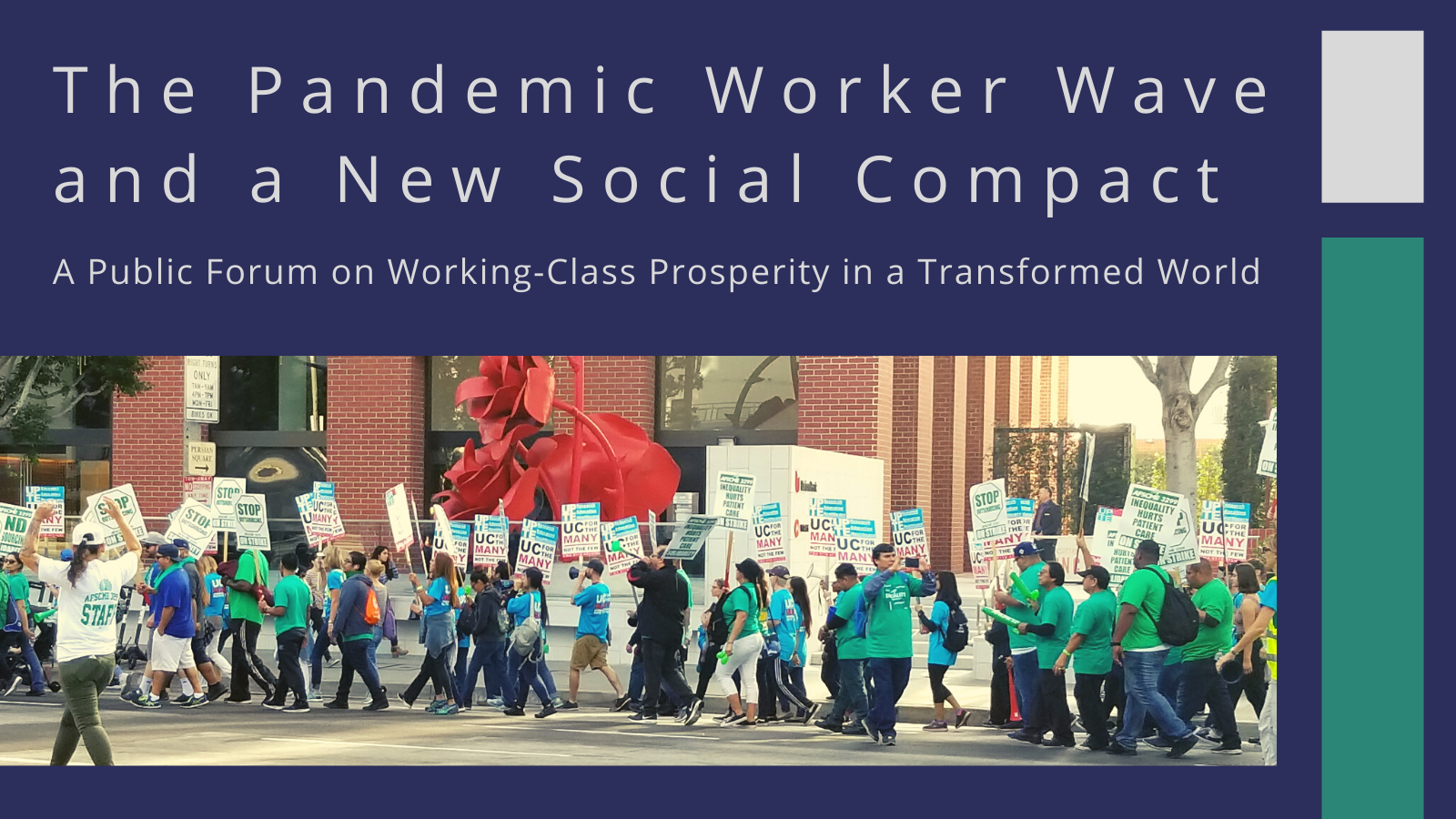Call for Nominations: The Pandemic Worker Wave and a New Social Compact

Posted in News | Tagged New Social Compact
The Kalmanovitz Initiative for Labor and the Working Poor at Georgetown University will convene a major public virtual gathering entitled, “The Pandemic Worker Wave and a New Social Compact: A Public Forum on Working-Class Prosperity in a Transformed World,” June 2-3, 2022, to explore and amplify the intersection of a fresh wave of global worker activism and new social compacts. The conference invites participants who can contribute to the exploration of ideas about workers’ rights and power and social compacts, through scholarship and / or activism. The gathering will build on and expand the discussion launched at Constructing a New Social Compact, a major virtual gathering in 2021.
The coronavirus pandemic has exposed and exacerbated the enormous pressures impacting working people across the world. Decades of low wages, long hours, precarious work, limited access to unions and little respect on the job have taken an enormous toll during the crisis. Though the public celebrated essential workers during the pandemic, there was no corresponding improvement in working conditions, and workers’ compensation remains too paltry to cover rising housing, education, child care and health care costs. People of color and women have been hit particularly hard by the multileveled impact of the pandemic, coupled with deep-seated economic precarity.
Consequently, we are in the midst of a period of working-class ferment, which holds the possibility of a global workers’ rights revival. Working people are increasingly engaging in collective action, such as through organizing and striking, in order to gain better wages, improved working conditions and increased agency on the job. Public approval of unions is at a nearly fifty-year high in the U.S., especially among young people.
Meanwhile, working people are voting with their feet and refusing to return to or accept the sorts of low-wage, no-security jobs that have become the norm over the last forty years. Record number of workers quit their jobs in 2021 in the “Great Resignation,” forcing a job market churn that has disrupted business as usual.
It remains unclear, however, whether current social compacts – – the constellations of laws, policies, organizations, and institutions that govern people’s social welfare – – can serve as viable platforms for the renewal of worker power and prosperity. Fissures along racial and gender lines, coupled with unchecked harm to the climate, have long undergirded the Social Democratic and New Deal-based social contracts. Neoliberalism has weakened workers’ rights across the globe, leaving working people with fewer tools and protections as they face enormous technological changes and workplace changes in today’s economy. What kinds of social compacts do we need in order to secure worker prosperity in a pandemic-altered world? To what extent are health care, housing, education, climate, and care core labor issues for the working class? What roles can governments, unions, worker-based organizations, non-profits, philanthropy, transnational organizations, universities and individuals play in building a revised social compact that rises to the reconfigured requirements of today’s economy and climate? Should we create new types of institutions to bolster workers’ power?
In addition, history reveals that moments of worker unrest, such as the strike waves that followed the world wars, were followed by intense periods of conservative backlash. Is such resistance emerging to eclipse workers’ current uprising, and how might workers and their organizations respond?
The Advisory & Organizing Committee of the New Social Compact project invites worldwide participation in the forum by activists, academics, faith leaders, policy experts, global labor activists, workers, philanthropists, labor organizations, elected leaders and others to explore building working-class prosperity in a post-pandemic world. The committee plans to curate a selection of panels, workshops, presentations, individual talks, cultural offerings, and videos that will convey ideas around this theme. We are accepting nominations for people, organizations, or topics to be covered by the forum. Please submit your nominations through this form, no later than February 28, 2022. Self-nominations are acceptable.
Some or all of the meeting will be closed captioned and interpreted into languages other than English. If you plan to participate in the meeting and need accommodations or interpretation, please email kilwp@georgetown.edu.
Organizing Committee (in formation):
Laura Gutierrez AFL-CIO
Carlos Jimenez AFL-CIO
Cathy Feingold AFL-CIO
Mary Cathryn Ricker Albert Shanker Institute
Carlos Torrealba Central Florida Climate Action / Jobs with Justice
Alan Barber Congressional Progressive Caucus Center
Michelle Miller coworker.org
Wilneida Negron coworker.org
Ruth Milkman CUNY School of Labor and Urban Studies
Stephanie Luce CUNY School of Labor and Urban Studies
Margaret Poydock Economic Policy Institute
Rev. Alvin Herring Faith in Action
Knut Panknin Friedrich Ebert Foundation
Ben Wilkins Fight for $15
John Monahan Georgetown University
JJ Rosenbaum Global Labor Justice / Int’l Labor Rts Forum
Tessa Bloechl ILO-USA
Sarah Morgan ILO-USA
Owen Tudor International Trade Union Confederation
Adam Shah Jobs with Justice
Shailly Barnes Kairos
James Benton Kalmanovitz Initiative / Georgetown University
Joseph McCartin Kalmanovitz Initiative / Georgetown University
Lily Ryan Kalmanovitz Initiative / Georgetown University
Lane Windham Kalmanovitz Initiative / Georgetown University
Lauren Burke Labor Network for Sustainability
Tanya Wallace-Gobern National Black Worker Center Project
Taylor Davis National Black Workers Center Project
Alana Eichner National Domestic Workers Alliance
Haeyoung Yoon National Domestic Workers Alliance
Sarah David Heydemann National Women’s Law Center
Dale Templeton National Education Association
Anthony K. Rogers-Wright New York Lawyers for the Public Interest
Meseret Araya Office of Representative Andy Levin (MI-9)
MaryGrace Menner Office of Representative Andy Levin (MI-9)
Shawna Bader-Blau Solidarity Center
Ryan Gerety United for Respect
Claudia Quinonez United We Dream
Gerson Quinteros United We Dream
Juan Manuel Guzman United We Dream
Michael Mendez University of California
Guilherme Machado Dray University of Lisbon
Julie Greene University of Maryland
Dwjuan Frazier University of Minnesota / History
William P. Jones University of Minnesota / History / LAWCHA
Jessica Champagne Worker Rights Consortium
For more information please contact kilwp@georgetown.edu.
